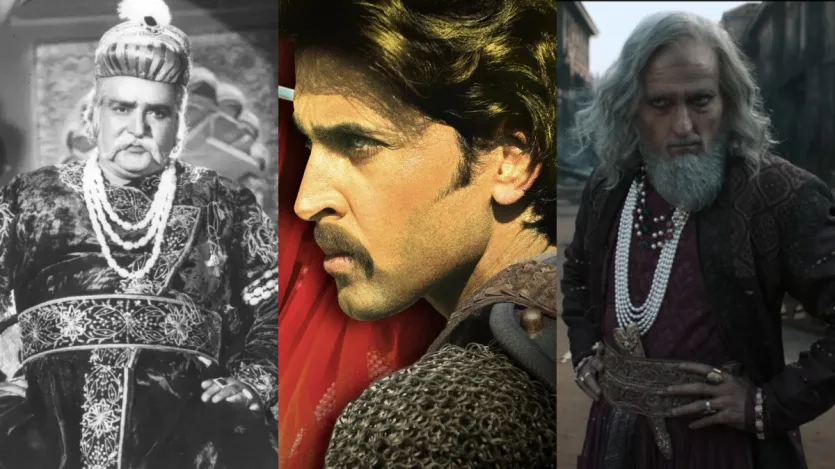 |
|
The portrayal of Mughal emperors in Bollywood cinema offers a fascinating lens through which to examine both historical interpretation and the evolving landscape of Indian filmmaking. From the early days of Indian cinema to contemporary productions, numerous actors have taken on the roles of these powerful rulers, each interpretation shaped by the socio-political context of its time and the director's vision. The article highlights several key performances, showcasing the diverse range of actors who have embodied these iconic figures and the varying degrees of historical accuracy and creative license employed in their depictions.
One of the earliest examples is Ashok Kumar's portrayal of Humayun in the 1945 film 'Humayun'. This film, a significant production for its time, demonstrates the early interest in historical narratives within the Indian film industry. While details of historical accuracy are debatable considering the filmmaking technology and historical understanding available in the 1940s, the film's success highlights the public's appetite for stories rooted in India's rich past. The film's casting, including Veena, Shah Nawaz, and Nargis, further underscores the emerging talent and the evolving nature of Bollywood at this crucial stage. This early representation sets the stage for future interpretations of Mughal emperors, offering a benchmark for later comparisons.
Prithviraj Kapoor's Akbar in K. Asif's 1960 masterpiece 'Mughal-e-Azam' remains a seminal performance. The film itself is legendary, not only for its lavish production design and memorable music but also for its enduring portrayal of the Mughal court. Kapoor's Akbar, commanding and regal, yet possessing a complex inner life, set a new standard for historical portrayals. The film's epic scope and attention to detail, despite some creative liberties with historical accuracy, cemented its place as a classic. The pairing of Dilip Kumar as Salim added to the film's enduring appeal, showcasing a complex father-son dynamic central to the Mughal narrative. This landmark film redefined the expectations of historical epics in Indian cinema, influencing future productions in terms of scale, ambition, and cinematic style.
The portrayal of Shah Jahan in several films reveals different approaches to the same historical figure. Pradeep Kumar's portrayal in the 1963 film 'Taj Mahal' focused on the emperor's emotional relationship with Mumtaz Mahal and his monumental act of constructing the Taj Mahal. In contrast, Kabir Bedi's 2011 portrayal in 'Taj Mahal: An Eternal Love Story' arguably offered a more theatrically oriented approach, highlighting the complexities of the emperor’s life within a different medium. These different interpretations illustrate the multifaceted nature of Shah Jahan’s legacy and how it continues to resonate with filmmakers and audiences.
The character of Aurangzeb, often viewed as a controversial figure in Indian history, has also been portrayed by various actors, including Om Puri in Shyam Benegal's 'Bharat Ek Khoj' and Ashutosh Rana in the web series 'Chhatrasal'. These portrayals showcase the different perspectives on Aurangzeb's reign, highlighting the complexities of his character and his actions. Puri's interpretation within the broader context of Indian history provides a nuanced perspective, while Rana's portrayal focuses on the impact of Aurangzeb's policies on a specific region and individual. These contrasting interpretations reflect not only evolving historical understanding but also the impact of differing storytelling formats, reflecting the growth of digital platforms and their influence on historical narratives.
Hrithik Roshan's Akbar in Ashutosh Gowariker's 'Jodha Akbar' (2008) represents a contemporary approach to the subject. This film, a significant box office success, presented a romanticized version of Akbar's relationship with Jodha Bai. The film's production design and the performances of Roshan and Aishwarya Rai Bachchan captured the attention of both audiences and critics, furthering the conversation around Akbar's reign. While subject to debate regarding historical accuracy, it undeniably generated significant cultural impact and discussions around Mughal history among a wider audience. The film's success also illustrates the continued popularity of historical epics in the evolving Indian film industry.
More recent portrayals such as Naseeruddin Shah's Akbar in the 2023 series 'Taj' continue the trend of reinterpreting these iconic figures for contemporary audiences. Each new adaptation reflects evolving cinematic styles, shifting historical perspectives, and the ever-changing tastes of viewers. The selection of actors, the narrative choices, and the production values all contribute to shaping the public’s understanding of these historical figures. The ongoing engagement with Mughal history in Bollywood suggests a continued fascination with these powerful rulers and the enduring legacy of the Mughal Empire in the Indian consciousness.
In conclusion, the multitude of actors who have portrayed Mughal emperors in Bollywood highlights the enduring fascination with this period of Indian history. These portrayals, ranging from early black-and-white productions to modern-day cinematic spectacles, reflect not only the evolution of the Indian film industry but also the evolving understanding and interpretation of historical figures. Each interpretation provides a unique perspective, engaging with the complexities of the past while simultaneously engaging with contemporary audiences.
Source: Akshay Khanna to Hrithik Roshan to Prithviraj Kapoor, actors who played Mughal emperors
